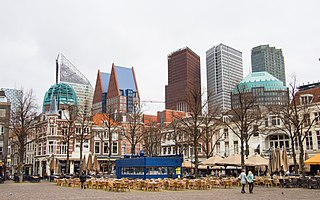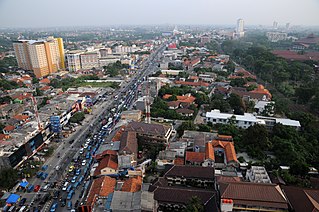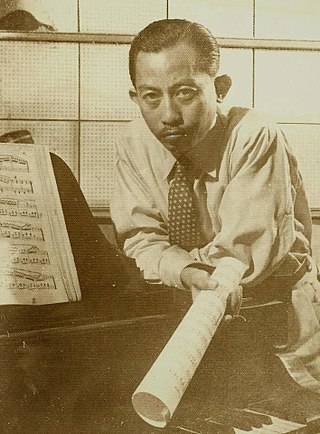
The Hague is the capital city of the South Holland province of the Netherlands. With a population of over half a million, it is the third-largest city in the Netherlands. Situated on the west coast facing the North Sea, The Hague is the country's administrative centre and its seat of government, and while the official capital of the Netherlands is Amsterdam, The Hague has been described as the country's de facto capital since the time of the Dutch Republic.

Indonesia is a country with many different tribes and ethnic groups, and its music is also very diverse, coming in hundreds of different forms and styles. Every region has its own culture and art, and as a result traditional music from area to area also uniquely differs from one another. For example, each traditional type of music is often accompanied by its very own dance and theatre. Contemporary music scene have also been heavily shaped by various foreign influences, such as America, Britain, Japan, Korea, and India.

Depok is a landlocked city in West Java province. It is located directly south of Jakarta, it is the third largest urban centre in the Greater Jakarta metropolitan area after Jakarta and Bekasi and it has an area of 199.91 km2. It had a population of 1,738,600 at the 2010 census and 2,056,400 at the 2020 census; the official estimate as at mid 2023 was 2,145,400, resulting in a density of 10,731.8 people per km2. Depok was created as a separate city on 20 April 1999, having previously been part of Bogor Regency. It constitutes the second most populous suburban city in Indonesia, and the tenth most populous suburban city globally.

Cirebon is a port city on the northern coast of the Indonesian island of Java. It is the only coastal city of West Java, located about 40 km west of the provincial border with Central Java, approximately 297 km (185 mi) east of Jakarta, at 6°43′S108°34′E. It had a population of 296,389 at the 2010 census and 333,303 at the 2020 census; the official estimate as at mid 2023 was 341,980.

Pasar malam is a Malay word that literally means "night market". A pasar malam is a street market in Indonesia, Malaysia, Brunei and Singapore that opens in the evening, usually in residential neighbourhoods. Pasar malams are culturally very similar to night markets in Asian countries such as China, Thailand, Taiwan, Vietnam, South Korea and India.

Jakarta Kota Station is a railway station, located in the old city core of Kota, Jakarta, Indonesia.

Kroncong is the name of a ukulele-like instrument and an Indonesian musical style that typically makes use of the kroncong. A kroncong orchestra or ensemble traditionally consists of a flute, a violin, at least one, but usually a pair of kroncongs, a cello in Pizzicato style, string bass in pizzicato style, and a vocalist. Kroncong originated as an adaptation of a Portuguese musical tradition, brought by sailors to Indonesian port cities in the 16th century. By the late 19th century, kroncong reached popular music status throughout the Indonesian archipelago.

Kemayoran is a district (kecamatan) of Central Jakarta, Jakarta in Indonesia. It was best known for the former Kemayoran Airport and it has been transforming as a new central business district. As of 2023, it consists of numerous four and five-star hotels, restaurants, premium office towers, hospitals as well as shopping and entertainment centers. Kemayoran is also home to the Jakarta Fair, the largest and longest fair in Southeast Asia that attracts more than 4 million visitors annually.

Sawah Besar is a district (kecamatan) of Central Jakarta, Indonesia. Its neighborhoods are among the most historic, containing the 1820-established Pasar Baru, the new colonial city – Weltevreden – and the old course of the Ciliwung River. Landmarks include the Lapangan Banteng, the government's 19th century, low-rise A.A. Maramis Building and its high palmed-lawned vista, and Jakarta Cathedral.

Kota Tua Jakarta, officially known as Kota Tua, is a neighborhood comprising the original downtown area of Jakarta, Indonesia. It is also known as Oud Batavia, Benedenstad, or Kota Lama.
Tjalie Robinson is the main alias of the Indo (Eurasian) intellectual and writer Jan Boon also known as Vincent Mahieu. His father Cornelis Boon, a Royal Netherlands East Indies Army (KNIL) sergeant, was Dutch and his Indo-European mother Fela Robinson was part Scottish and Javanese.

Ismail Marzuki was an Indonesian composer, songwriter and musician who wrote around 202 to 240 songs between 1931 and 1958, including numerous popular patriotic songs. Among his best-known works are "Halo, Halo Bandung", "Gugur Bunga", and "Rayuan Pulau Kelapa". In 1968, he was honoured with the creation of the well-known Taman Ismail Marzuki which is a cultural centre in Menteng in central Jakarta. In 2004 he was declared one of the National Heroes of Indonesia.

Merdeka Square is a large square located in the center of Jakarta, Indonesia. Merdeka is the Indonesian word for freedom or independence. Measuring approximately one square kilometer in area, if the surrounding fields within the Merdeka Square are included, it is considered one of the largest squares in the world. At 75 hectares, it is over five times the size of Tiananmen Square, and 12 times the size of Place de la Concorde.

Jakarta Fair is a fair held annually in Jakarta International Expo Kemayoran, Jakarta, Indonesia, in June and July. It features exhibitions, trade promotions, shopping, music performances, various shows, amusement rides and a food festival. Jakarta Fair is part of a series of events to held to celebrate the capital's anniversary, which falls on June 22. The Jakarta Fair sees exhibitors from across the country display a whole range of goods and products ranging from specialty food items to traditional handmade arts and crafts. In addition to the many exhibitors, there is also live entertainment including music, dance and cultural performances.

Andy Tielman was an influential Indo (Eurasian) artist, recognised as the "godfather" of Indorock, the style of rock and roll played by Indo artists in the 1950s and 1960s. He is considered one of the most important figures in Dutch popular music, and "defied the notion that early rock and roll was a phenomenon of white and black musicians from America".

Victor Ido is the main alias of the Indo (Eurasian) Dutch language writer and journalist Hans van de Wall. Born in Surabaya, Dutch East Indies from a Dutch father and Indo (Eurasian) mother. Ido was the Art Editor of P.A.Daum's Bataviaasch Nieuwsblad and later the Chief Editor of newspaper Batavia's Handelsblad as well as an accomplished musician (organist).

The Gambir Fair was a fair held in 1906 and yearly from 1921 until 1942 in the Koningsplein, Batavia, Dutch East Indies to celebrate the birthday of Queen Wilhelmina of the Netherlands. After the Japanese occupied the Indies, the fair was no longer held. However, after a failed attempt in 1952, in 1968 it was reinstated as the Jakarta Fair.

The Indo people or Indos are Eurasian people living in or connected with Indonesia. In its narrowest sense, the term refers to people in the former Dutch East Indies who held European legal status but were of mixed Dutch and indigenous Indonesian descent as well as their descendants today.
Wanda de Fretes is a singer and recording artist who was popular in the Netherlands in the 1960s. She is also the daughter of legendary Moluccan steel guitarist George de Fretes and singer Joyce Aubrey. In addition to her solo efforts, she also recorded with her mother as the duo Wanda & Joyce. Besides singing pop and rock'n roll, she also sang traditional Indonesian and Malayan songs.

Jakarta Great Sale Festival or Festival Jakarta Great Sale (FJGS) is an annual sale festival which is held to celebrate anniversary of Jakarta, Indonesia. It is held in the month of June and July.
























